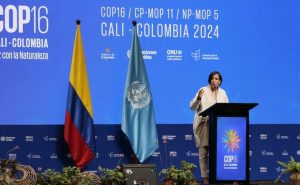With political will, Global North countries could deliver on $20 billion per year by 2025 and at least $30 billion per year by 2030 that is essential for accelerating implementation towards achieving the 2030 global biodiversity targets and 2050 goals.

This was the submission of a group of campaigners operating under aegis of the Climate Action Network International, even as the 16th meeting of the Conference of the Parties (COP16) to the Convention on Biological Diversity (CBD) (or UN Biodiversity Conference) commenced on Monday, October 21, 2024.
They insist that, against this backdrop, structural economic and political conditions underlying drivers of biodiversity loss and constraining government action, like financial system transformation, debt and tax justice, need to be addressed.
They stressed that finance is the big focus at this round of crucial UN biodiversity talks taking place in Cali, Colombia over the next two weeks.
“A pivotal moment for advancing global efforts on biodiversity, climate and social justice goals, it’s the first Convention on Biological Diversity Conference of the Parties (CBD COP16) since the landmark Kunming-Montreal Global Biodiversity Framework was adopted in 2022 following a series of delays related to the COVID-19 pandemic.”
According to CAN, a set of demands released to mark the CBD COP16 emphasises the need for the Kunming-Montreal Global Biodiversity Framework to be transformed into ambitious national-level implementation.
“At a time of multiple converging and mutually reinforcing crises, it is critical that national biodiversity and climate plans are aligned, integrate a human-rights based approach and do not rely on dangerous approaches and distractions. The voices and needs of Indigenous Peoples, environmental defenders and marginalised communities must be heard and recognised, and their rights guaranteed, with the official agenda for the biodiversity negotiations reflecting this,” added the group.
It added that the Cali talks need to send a strong political signal showing the strengthening of joint climate, biodiversity and rights ambition.
“This should entail increased cooperation across the three Rio Conventions to maximise synergies and minimise trade-offs, as healthy ecosystems are the life support for all of humanity and play a fundamental role in tackling climate change.”
Argentinian campaigner Catalina Gonda, and one of Climate Action Network’s representatives at the biodiversity talks, said: “There is growing concern here that the level of ambition will fall far short of global biodiversity targets. Only a handful of countries, which are signed up to the Kunming-Montreal Global Biodiversity Framework, have revised their action plans. At a time of catastrophic natural loss across the globe, which is accelerating the climate crisis, it is more than alarming that countries are risking pushing us to the brink, particularly people in frontline and marginalised communities.”
The Kunming-Montreal Global Biodiversity Framework calls for closing the estimated $700 billion annual biodiversity funding gap through the following steps: reforming harmful incentives by at least $500 billion per year by 2030; increasing the level of financial resources from “all sources” to at least $200 billion per year by 2030; and mobilising international biodiversity finance from developed to developing countries to at least $20 billion annually by 2025 and $30 billion by 2030.
“The level of ambition demonstrated at COP16 hinges on how successfully rich nations demonstrate progress on the most imminent target of mobilising $20 billion annually by 2025 for developing countries. However, we know this is far from enough, and we need transformational approaches to address the root causes that keep extractivism in place, such as reforming harmful incentive schemes, preventing tax avoidance, cancelling debt in Global South countries to free up funds, and rethinking austerity measures,” said Gonda.
